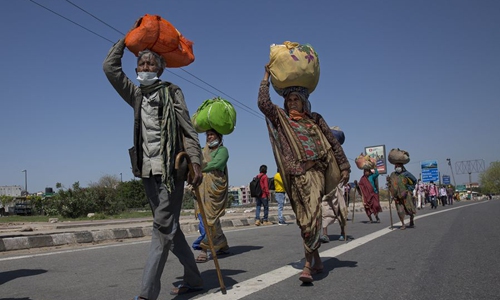India lockdown triggers migrant worker exodus, fear of viral spread
By Li Aixin Source:Global Times Published: 2020/3/31 17:43:40

Migrant laborers walk to their villages during the lockdown in New Delhi, India, on March 29. Photo: Xinhua
India is witnessing large-scale migration flows after businesses were shut down in cities amid a nationwide coronavirus lockdown, with experts believing a situation that is most conducive to the spread of COVID-19 is taking shape in the country.Over the past few days, streets on the outskirts of Indian capital New Delhi have been filled with migrant laborers waiting in queues to board crowded private buses for home. Videos showed some of them were without masks and some barely covered their mouths with scarves. There are also large numbers of migrants setting out from major cities on foot and walking hundreds of miles toward home.
On March 24, Indian Prime Minister Narendra Modi ordered a 21-day "complete" lockdown across the country, starting from midnight on March 25, trying to halt the coronavirus epidemic. All 1.3 billion people are required to remain indoors until April 15. During the period, all public transportation has been suspended as the government believes the measures are crucial to breaking the cycle of infection.
But according to observers, the lockdown means hunger, unemployment and homelessness for many Indians.
A large number of Indian laborers work in informal sectors with little social security and are living from hand to mouth, Mao Keji, a distinguished research fellow at the Yunnan Academy of Social Sciences, told Global Times on Tuesday, adding that they have no alternative but to go home after realizing there will be no way to make a living for at least three weeks.
Swaran Singh, professor at Jawaharlal Nehru University, echoed this view. He told Global Times that most of the people leaving major megacities for home either live on work sites that are now closed, or slums that have terrible conditions.
The exodus of so many people could easily trigger a sharp increase in infections due to their lack of basic hygiene conditions, experts noted.
Reports have shown many of the migrant laborers walking in groups without practicing social distancing, with some barefoot and wearing stained and tattered clothes. To make matters worse, they sleep and eat along the streets without proper sanitary conditions.
Moreover, growing social controversies are bubbling amid the crisis, which may even lead to unrest in the near future, Mao said.
This poses a huge challenge to the country's efforts to contain the spread of COVID-19, observers said. "The Indian administration might want to cut the knot via a stringent lockdown, but it is proving to be a measure full of loopholes which is hurting India before having any effect," Mao noted.
On Monday, India recorded the highest single-day spike of 227 new positive cases and five deaths, raising the total number of infections to over 1,300.
Posted in: SOCIETY,CHINA-INDIA